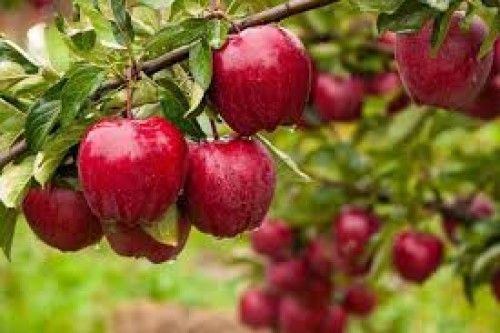off
-
Sold
-

out
Apple Plant: Nature, Care & Advantages
The apple plant is one of the most widely cultivated fruit-bearing trees globally, prized for its delicious fruit, ornamental value, and economic importance. Belonging to the genus Malus, apples thrive in temperate climates and produce a wide variety of sweet to tart fruits with high nutritional value.
Nature of the Apple Plant
Apple trees are deciduous and grow best in cold climates with distinct seasons. They can range in height from dwarf varieties (6-10 feet) to standard trees (up to 30 feet). Apple trees have a rounded crown, dense green foliage, and bloom with beautiful white or pink flowers in spring. These flowers later develop into the crisp, juicy fruits we all love.
Most apple trees require cross-pollination, meaning you’ll often need two or more different varieties planted nearby to ensure fruit production.
Care for the Apple Plant
- Climate: Apples grow best in cool to cold climates with sufficient winter chill. Ideal growing zones are temperate regions with warm days and cool nights.
- Soil: Apples prefer well-drained loamy soil, slightly acidic (pH 6.0–6.8), enriched with organic matter.
- Sunlight: Full sunlight is essential — at least 6–8 hours daily for optimal growth and fruit production.
- Watering: Regular watering is important, especially in the first few years. Keep the soil moist but not waterlogged. Deep watering is better than frequent light watering.
- Fertilization: Use compost or a balanced fertilizer (e.g., 10-10-10 NPK) in early spring. Avoid excessive nitrogen, as it promotes foliage over fruit.
- Pruning: Prune in late winter to maintain shape, remove dead or diseased wood, and encourage airflow and fruiting.
- Pest & Disease Control: Keep an eye out for common issues like apple scab, aphids, and codling moth. Use organic pesticides or integrated pest management methods as needed.
Advantages of Growing Apples
- Highly Nutritious: Apples are rich in dietary fiber, vitamin C, and antioxidants. They support digestive health, weight management, and immunity.
- Economic Value: Apples are one of the most commercially valuable fruit crops, making them a good option for orchard farming and income generation.
- Long Lifespan: A healthy apple tree can bear fruit for 20–30 years or more with proper care.
- Delicious & Versatile: Apples can be eaten fresh, juiced, baked, or turned into cider, vinegar, jams, and more.
- Environmental Benefits: Apple trees enhance biodiversity, improve air quality, and provide habitat for pollinators like bees.
- Aesthetic Value: In addition to producing fruit, the tree's spring blossoms and lush summer foliage add beauty to gardens and landscapes.
Conclusion
Apple plants are an excellent choice for gardeners and farmers looking to grow a rewarding fruit tree that offers both aesthetic appeal and health benefits. With the right climate, soil, and care, apple trees can provide decades of delicious fruit while contributing to a greener environment and a healthier lifestyle.

